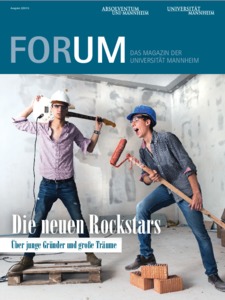|
Forum
![[img]](https://madoc.bib.uni-mannheim.de/41199/1.hassmallThumbnailVersion/FORUM%202-2015_FINAL.pdf)  Vorschau |
|
PDF
FORUM 2-2015_FINAL.pdf
- Veröffentlichte Version
Download (9MB)
|
|
Körperschaften:
|
Rektor der Universität Mannheim
;
Absolventum Mannheim
|
Mitwirkende
(z.B. Übers., Bearb.):
|
Bär, Katja
|
|
URL:
|
https://ub-madoc.bib.uni-mannheim.de/41199
|
|
URN:
|
urn:nbn:de:bsz:180-madoc-411995
|
|
Dokumenttyp:
|
Zeitschrift / Schriftenreihe
|
|
Erscheinungsjahr:
|
2015
|
|
Titel einer Zeitschrift oder einer Reihe:
|
Forum : das Magazin der Universität Mannheim
|
|
Band/Volume:
|
2015
|
|
Heft/Issue:
|
2
|
|
Ort der Veröffentlichung:
|
Mannheim
|
|
Verlag:
|
Universität
|
|
ISSN:
|
1613-1622
|
|
Sprache der Veröffentlichung:
|
Deutsch und Englisch
|
|
Einrichtung:
|
Zentrale Einrichtungen > Absolventum
Zentrale Einrichtungen > Verwaltung
|
|
MADOC-Schriftenreihe:
|
Veröffentlichungen der Universität Mannheim > Forum
|
|
Fachgebiet:
|
000 Allgemeines, Wissenschaft
|
|
Freie Schlagwörter (Deutsch):
|
Universität , Gründergeist , Startups , Gründungen von Mannheimer Absolventen , Netzwerke
|
|
Abstract:
|
Ob Spaghettieis, das Auto oder das Fahrrad – sie alle sind Mannheimer Erfi ndungen und zeigen, wie viel Gründungsgeist in dieser Stadt steckt. Dass sich dieser auch auf unsere Studierenden überträgt,
beweisen die zahlreichen Startups, die von ihnen in den vergangenen Jahren gegründet wurden. Die Einen bauen schon während ihres Studiums ein Unternehmen auf, wie zum Beispiel von Jungfeld und Herrenfahrt, die den Markt gerade mit bunten Herrensocken und
Pflegeprodukten für wertvolle Automobile aufmischen (S. 12). Andere wiederum gehen zunächst den klassischen Weg einer Festanstellung, bevor sie eine zündende Idee in die Tat umsetzen: Alexander Rittweger, der Gründer von Payback und BWL-Absolvent unserer Universität, zum Beispiel. Im Interview schaut er auf die vergangenen 15 Jahre seines Unternehmens zurück und gibt einen Überblick über die Herausforderungen in der deutschen Startup-Szene (S. 15). Vor fünf Jahren hat er Payback für eine halbe Milliarde an American Express verkauft – ein erfolgreicher „Exit“, der Traum vieler Gründer.
Was nach dem Verkauf des eigenen Unternehmens möglich ist, lesen Sie auf Seite 30 anhand von Beispielen wie dem Musikstreaming-Dienst simfy oder tesa scribos, den Erfi ndern des mit Daten bedruckten Tesastreifens – beides Gründungen von Mannheimer Absolventen.
Auch die Universität „gründet“ und erweitert sich: So wurde in diesem April der Grundstein für ein neues Forschungs- und Lehrgebäude in B6 gelegt und die Mannheim Business School ist im Begriff, den ehemaligen Kohlekeller der Uni zu einem hochmodernen Studien-und Konferenzzentrum umzubauen (S. 6). Seit diesem Sommer bereichert außerdem das neu gegründete „Institut Français“, von welchem die Uni einer von sieben Trägern ist, die städtische Kultur
und Wissenschaft. Das Mannheimer Institut ist nun eins von insgesamt elf Instituts Français mit Kulturschwerpunkt in Deutschland (S. 42). Das größte und älteste Alumni-Netzwerk der Republik blickt
in diesem Jahr hingegen auf seine eigene Gründung vor 20 Jahren zurück (S. 41). Mit rund 7.000 Mitgliedern und 46 Regionalgruppen hat ABSOLVENTUM in zwei Jahrzehnten ein Netzwerk aufgebaut, welches sich von Mannheim über den gesamten Globus erstreckt.
|
|
Übersetzung des Abstracts:
|
Whether it’s spaghetti ice cream, the automobile or the bicycle – they are all Mannheim inventions and demonstrate the great potential of the pioneering spirit there is in this city. That this has rubbed
off on our students is shown by the numerous startups which they have founded in recent years. Some set up enterprises while still studying, as for example von Jungfeld and Herrenfahrt, which are stirring up the market with colourful men’s socks and care products
for high class automobiles (p. 12). Others in contrast follow the classic path of regular employment before they put a brilliant idea into practice: Alexander Rittweger, the founder of Payback and Business
Administration graduate of our university, for example. In an interview he looks back on his company’s last 15 years and gives an overview of the challenges in the German startup scene (p. 15). Five
years ago he sold Payback for half a billion to American Express – a successful “exit”, the dream of many company founders. You can read what’s possible after selling your own business on page 30,
based on examples such as the music streaming service simfy or tesa scribos, the inventors of the adhesive tape printed with data - both startup enterprises founded by Mannheim graduates. The university too is “founding” and expanding: thus in April this
year the foundation stone was laid for a new research and teaching building in B6 and the Mannheim Business School is in the process of converting the former coal cellar of the university into an ultramodern
study and conference centre (p. 6). Since this summer the newly founded “Institut Français”, of which the university is one of the seven sponsors, is enriching the city’s cultural and scientific landscape. The Mannheim institute is now one of a total of eleven
Instituts Français with a cultural focus in Germany (p. 42). The largest and oldest alumni network of the republic can look back this year on its own founding 20 years ago (p. 41). With around 7,000 members and 46 regional groups, ABSOLVENTUM has built up a network in two decades which stretches from Mannheim across the
whole globe.
(Englisch)
|
 | Dieser Eintrag ist Teil der Universitätsbibliographie. |
 | Das Dokument wird vom Publikationsserver der Universitätsbibliothek Mannheim bereitgestellt. |
Sie haben einen Fehler gefunden? Teilen Sie uns Ihren Korrekturwunsch bitte hier mit: E-Mail
Actions (login required)
 |
Eintrag anzeigen |
|
|
